7. January 2019 - 22:57
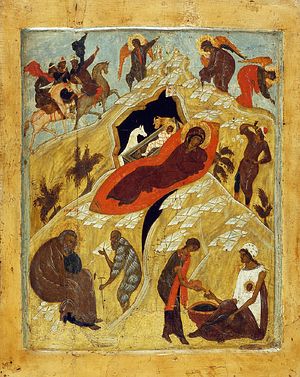 BEHOLD a new and wondrous mystery.
BEHOLD a new and wondrous mystery.
My ears resound to the Shepherd’s song, piping no soft melody, but chanting full forth a heavenly hymn. The Angels sing. The Archangels blend their voice in harmony. The Cherubim hymn their joyful praise. The Seraphim exalt His glory. All join to praise this holy feast, beholding the Godhead here on earth, and man in heaven. He Who is above, now for our redemption dwells here below; and he that was lowly is by divine mercy raised.
Bethlehem this day resembles heaven; hearing from the stars the singing of angelic voices; and in place of the sun, enfolds within itself on every side, the Sun of justice. And ask not how: for where God wills, the order of nature yields. For He willed; He had the power; He descended; He redeemed; all things yielded in obedience to God. This day He Who is, is Born; and He Who is, becomes what He was not. For when He was God, He became man; yet not departing from the Godhead that is His. Nor yet by any loss of divinity became He man, nor through increase became He God from man; but being the Word He became flesh, His nature, because of impassability, remaining unchanged.
30. December 2018 - 1:57
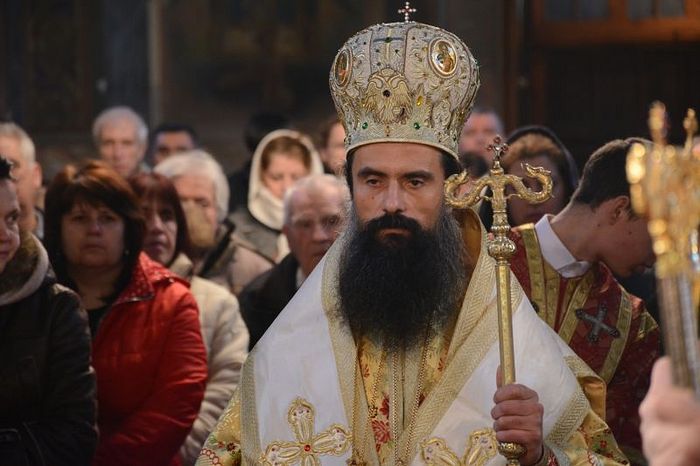 “I will answer you in the words of one of the archbishops of the canonical Church, with which he responded to the invitation of Patriarch Bartholomew to attend this assembly: I am firmly convinced and confess that I remain faithful to the One Orthodox Church, and my presence at this council contradicts the first Psalm of David, which reads as follows, “Blessed is the man that hath not walked in the counsel of the ungodly, nor stood in the way of sinners, nor sat in the seat of the pestilent. But his will is rather in the law of the Lord, and in His law will he meditate day and night.” What could be the outcome of a council that is convened in violation of the canonical order and involving persons outside the Church? In my opinion, this Council will not heal the division among the faithful people in Ukraine, but will deepen it. In this whole mournful situation there is a comforting thing – the desire of Orthodox people in this country to preserve the unity of the Holy Orthodox Church, and that this finds a response and support across the entire Orthodox world.”
“I will answer you in the words of one of the archbishops of the canonical Church, with which he responded to the invitation of Patriarch Bartholomew to attend this assembly: I am firmly convinced and confess that I remain faithful to the One Orthodox Church, and my presence at this council contradicts the first Psalm of David, which reads as follows, “Blessed is the man that hath not walked in the counsel of the ungodly, nor stood in the way of sinners, nor sat in the seat of the pestilent. But his will is rather in the law of the Lord, and in His law will he meditate day and night.” What could be the outcome of a council that is convened in violation of the canonical order and involving persons outside the Church? In my opinion, this Council will not heal the division among the faithful people in Ukraine, but will deepen it. In this whole mournful situation there is a comforting thing – the desire of Orthodox people in this country to preserve the unity of the Holy Orthodox Church, and that this finds a response and support across the entire Orthodox world.”
29. December 2018 - 23:34
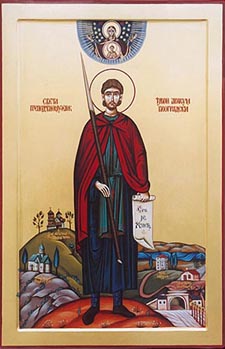 After the collapse of Karageorge’s revolt in 1813, the Turks began a reign of terror against the Serbs. Disease also swept the area because of the many bodies left unburied. The people attempted another revolt under Hadj-Prodan Gligorijevic, and the monks of Trnava became involved in it. The rebellion took place on the Feast of the Cross (September 14), but it was crushed by the Turks. Many people were captured, and some were executed on the spot as a warning to others.
After the collapse of Karageorge’s revolt in 1813, the Turks began a reign of terror against the Serbs. Disease also swept the area because of the many bodies left unburied. The people attempted another revolt under Hadj-Prodan Gligorijevic, and the monks of Trnava became involved in it. The rebellion took place on the Feast of the Cross (September 14), but it was crushed by the Turks. Many people were captured, and some were executed on the spot as a warning to others.
Some of the prisoners were sent to Suleiman Pasha in Belgrade, among whom were Sts Paisius and Avakum. The holy deacon Avakum sang “God is with us” (from Compline) in the prison cell, while St Paisius prayed. The Turks offered to free anyone who would convert to Islam. Some of the prisoners agreed to this, but the majority refused to deny Christ, and so they were put to death.
26. December 2018 - 13:03
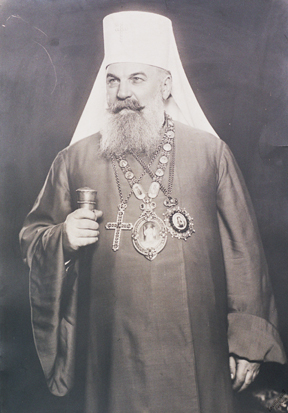 Gavrilo I Rajić (died 1659) was Archbishop of Peć and Serbian Patriarch between 1648 and 1655. He was murdered by Turks and therefore celebrated by Eastern Orthodox Church as Hieromartyr. His feast day is celebrated on December 13.
Gavrilo I Rajić (died 1659) was Archbishop of Peć and Serbian Patriarch between 1648 and 1655. He was murdered by Turks and therefore celebrated by Eastern Orthodox Church as Hieromartyr. His feast day is celebrated on December 13.
Metropolitan
Gavrilo was born around 1605–1610 in the region of Stari Vlah into a noble Rajić family. He entered into the church service and became Metropolitan of Smederevo. In 1643, he was elected Metropolitan of Raška. Around 1644, He rebuilt the Monastery of the Holy Archangels in the Kovilje Mountains. After the death of Serbian Patriarch Pajsije on November 3/13 1647, Gavrilo was elected new patriarch in 1648.[1]
Patriarch
In 1653, he decided to travel to Russia to ask for material support for Serbian Patriarchate of Peć. After meeting with Metropolitan Arsenije of Herzegovina on Christmas Eve, he went first to Wallachia and arrived in Trgovište where he tried to reconcile the Wallachian Prince Matei Basarab with the Cossack Hetman Bohdan Khmelnytsky. From there, Patriarch Gavrilo traveled to Russia in 1654, taking with him two books for printing: Lives of Serbian Emperors and Patriarchs and Typikon against Latin Heresy of Saint Nil Kabasilas. He was welcomed by Russian Patriarch Nikon and Russian Tsar Michael Romanov. He also participated in the famous Moscow Synod in 1658 which approved Nikon's reforms. Since he decided to stay in Russia, he wrote to Serbian metropolitans to elect a new patriarch.[2]
Soon after, he changed his mind and left Russia arriving back to Ottoman Empire in 1659. Upon return, he was accused by the Turks of being responsible for the Russo-Turkish War. he was also accused of attempting to convert some Turks to Christianity. Brought before the tribunal, he was ordered to embrace Islam. After Gavrilo refused, he was sentenced to death. He was executed in Bursa on July 18, 1659. Presbyter Pavle took his remains and buried them. He was entered on the list of Serbian saints.[3]
References
Sources
External links
25. December 2018 - 12:51
 The Information Service of the Serbian Orthodox Church congratulates the feast of the Birth of the Divine God-Child to believers and clergy of the Christian Churches which celebrate Christmas according to Gregorian calendar and greets them with the traditional greeting:
The Information Service of the Serbian Orthodox Church congratulates the feast of the Birth of the Divine God-Child to believers and clergy of the Christian Churches which celebrate Christmas according to Gregorian calendar and greets them with the traditional greeting:
CHRIST IS BORN! - HE IS BORN INDEED!
17. December 2018 - 11:18

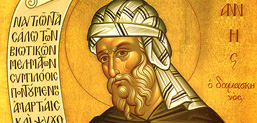 John was first the chief minister to Caliph Abdul-Malik and later a monk in the Monastery of St. Sava the Sanctified.
John was first the chief minister to Caliph Abdul-Malik and later a monk in the Monastery of St. Sava the Sanctified.
Because of his ardent defense of the veneration of icons during the reign of the iconoclastic Emperor Leo the Isaurian, John was maligned by the emperor to the Caliph, who cut off his right hand. John fell down in prayer before the icon of the Most-holy Theotokos, and his hand was rejoined and miraculously healed.
 BEHOLD a new and wondrous mystery.
BEHOLD a new and wondrous mystery.

 After the collapse of Karageorge’s revolt in 1813, the Turks began a reign of terror against the Serbs. Disease also swept the area because of the many bodies left unburied. The people attempted another revolt under Hadj-Prodan Gligorijevic, and the monks of Trnava became involved in it. The rebellion took place on the Feast of the Cross (September 14), but it was crushed by the Turks. Many people were captured, and some were executed on the spot as a warning to others.
After the collapse of Karageorge’s revolt in 1813, the Turks began a reign of terror against the Serbs. Disease also swept the area because of the many bodies left unburied. The people attempted another revolt under Hadj-Prodan Gligorijevic, and the monks of Trnava became involved in it. The rebellion took place on the Feast of the Cross (September 14), but it was crushed by the Turks. Many people were captured, and some were executed on the spot as a warning to others. Gavrilo I Rajić (died 1659) was Archbishop of Peć and Serbian Patriarch between 1648 and 1655. He was murdered by Turks and therefore celebrated by Eastern Orthodox Church as Hieromartyr. His feast day is celebrated on December 13.
Gavrilo I Rajić (died 1659) was Archbishop of Peć and Serbian Patriarch between 1648 and 1655. He was murdered by Turks and therefore celebrated by Eastern Orthodox Church as Hieromartyr. His feast day is celebrated on December 13. The Information Service of the Serbian Orthodox Church congratulates the feast of the Birth of the Divine God-Child to believers and clergy of the Christian Churches which celebrate Christmas according to
The Information Service of the Serbian Orthodox Church congratulates the feast of the Birth of the Divine God-Child to believers and clergy of the Christian Churches which celebrate Christmas according to 
 John was first the chief minister to Caliph Abdul-Malik and later a monk in the Monastery of St. Sava the Sanctified.
John was first the chief minister to Caliph Abdul-Malik and later a monk in the Monastery of St. Sava the Sanctified. 